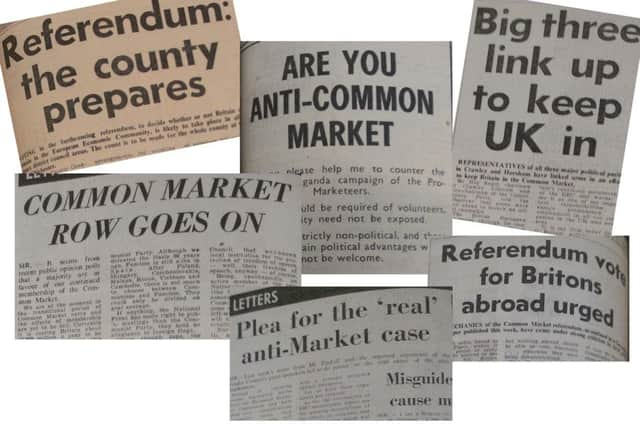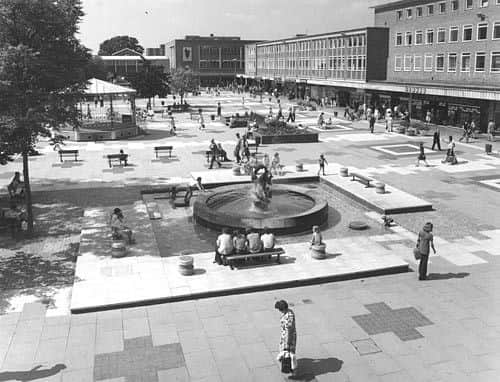Referendum fever 1975 and 2016
This article contains affiliate links. We may earn a small commission on items purchased through this article, but that does not affect our editorial judgement.


The year was 1975 and Britain had been part of the European Economic Community since 1973, when the Treaty of Rome was signed.
But not everyone was happy and the Labour Party included the promise of a referendum in its 1974 election manifesto. The country voted them in, the promise was kept, and the arguing began.
Advertisement
Hide AdAdvertisement
Hide AdThe question put to the country was: “Do you think the UK should stay in the European Community (Common Market)?” The answer was a resounding ‘yes’, with 67 per cent of those who voted choosing to stay.


But the run-up to the referendum had seen emotions rising as high as they have in the past few months and, with the internet and social media still very much the stuff of sci-fi dreams, people picked up their pens and vented their spleens in print.
When they weren’t doing that, they were discussing their views with reporters on the streets of Crawley - and some of the arguments and fears for and against have come around again in 2016.
Mr WE Harrington said: “We must stay in the market for every reason. We are too small to survive without it. We certainly have a hell of a lot to lose if we don’t stay in.”
Advertisement
Hide AdAdvertisement
Hide AdJohn Carrott, of Northgate, said: “I think we ought to stay in. The combined EEC stands a better chance of competing against other large countries such as America and Russia than Britain would alone. I definitely feel that we have benefited from the EEC and that we will suffer if we get out.”


Mr Dore, of Langley Green, had a different view and said: “We should never have gone into the Common Market - we were not ready for it. We must take the opportunity to get out of the EEC.”
One of the concerns in 1975 was whether or not the average person on the street had enough factual, non-biased information to allow him or her to make a well-informed decision.
There was plenty of scaremongering afoot from both sides - sounds familiar - and the concern was people would be swayed by half-truths from those who stood to personally gain from an ‘in’ or ‘out’ vote.
Advertisement
Hide AdAdvertisement
Hide AdMrs Baton, who was frequently called to Brussels in her role of interpreter, wrote to the Observer saying she had been struck by the “lack of objective information” available to people.
She wrote: “I see around me masses of people who are misguided in one direction or the other. When I think that those people will have to vote in the referendum, I have grave misgivings indeed.
“Whatever our political inclinations, whatever our likes and dislikes, we owe it to ourselves and others to make up our minds on the basis of clear and objective knowledge, not on what we learn from those who have a vested interest in bending our vote in a particular direction.”
Mrs Baton was clearly a wise woman and her letter would have been just as relevant in 2016 as it was in 1975.
Advertisement
Hide AdAdvertisement
Hide AdAnother wise one was Royston Snart, chairman of the Crawley Liberals, who was just as annoyed by the lack of solid information. He was also concerned about the number of people who had latched onto soundbites of information and refused to let go, even when their credibility had been blown away.
He wrote in the Observer: “Instead of repeating already discredited myths about the EEC and half-baked over-simplifications of complex issues, they should tell us who will benefit from UK withdrawal and how.”
Mr Snart called on both sides to make their arguments clear and concise - today he would be telling leaders to stop spinning the issues. He even questioned whether those determined to leave the Common Market had “a personal prejudice against foreigners”.
His letter asked: “As for the alternatives to EEC membership, where are the glowing descriptions of the effects of economic and political isolation which will be celebrated on ‘Independence Day’?
Advertisement
Hide AdAdvertisement
Hide Ad“Where do they extol the delights of a siege economy and the depravations such as Little Britain enjoyed in the Dunkirk Spirit days?
“Have they forgotten the attractions of additional leisure time which many will be forced to take when the decline of British industry creates mounting unemployment?”
While his point about the need for facts was well made, we’re guessing Mr Snart was part of the ‘remain’ camp. He wasn’t wrong about the unemployment, though. It just took a few years for the effects to show.
Out on the streets, there were public meetings and rallies. Crawley and Horsham MP Peter Hordern made a tour of the two towns, appealing to everyone to vote ‘stay’; and, of course, there was the familiar sight of members from opposing camps trying to ignore each other as they manned their stalls in Queens Square.
Advertisement
Hide AdAdvertisement
Hide AdThere are one million miles of difference between life in 1975 and life in 2016 but it’s clear that many of people’s fears and concerns have remained the same.
The UK has been part of the European family for more than 40 years now, but now we’ve decided it’s time to leave home and set out on our own.
It will be interesting to see if the voters of 2057 look back at the choices made in 2016 and thank us.
Don’t miss out on all the latest breaking news where you live.
Advertisement
Hide AdAdvertisement
Hide AdHere are four ways you can be sure you’ll be amongst the first to know what’s going on.
1) Make our website your homepage at www.crawleyobserver.co.uk
2) Like our Facebook page at www.facebook.com/crawleyobserver
3) Follow us on Twitter @Crawley_Obby
4) Register with us by clicking on ‘sign in’ (top right corner). You can then receive our daily newsletter AND add your point of view to stories that you read here.
And do share with your family and friends - so they don’t miss out!
The Crawley Observer - always the first with your local news.
Be part of it.